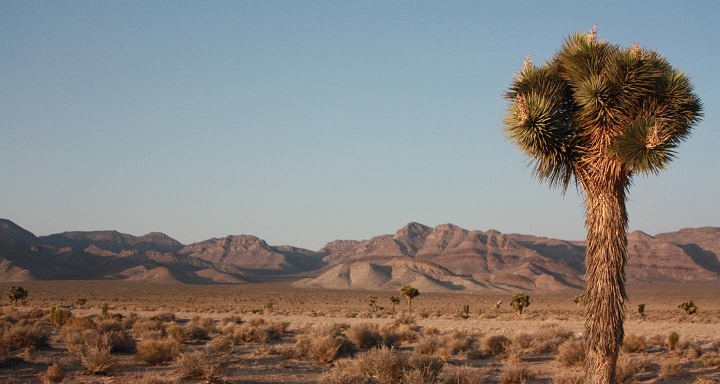Scientists using crowdfunding to sequence the genome of Joshua tree
This image shows Yucca Brevifolia Tikaboo, June 2014.
Scientists at the Donald Danforth Plant Science Center have teamed up with researchers at Willamette University, a liberal arts college in Salem Oregon, to develop genetic tools that could save the Joshua tree from extinction. Together with scientists from The University of Georgia and the University of British Columbia, and with the support of several Mojave Desert conservation organizations, researchers are inviting members of the public to help get the project off the ground by making donations at the crowdfunding site Experiment.com. In the past two weeks, more than 100 backers have donated more than $4,000 to The Joshua Tree Genome Project. The project aims to raise $8,500 by March 24th.
Joshua trees are the iconic species of the Mojave Desert, the hottest and driest desert region of North America. This keystone species provides food and habitat for many other species, and numerous State and National Parks are dedicated to their conservation. However, emerging research suggests that Joshua trees are disappearing across much of the Mojave Desert, perhaps because of ongoing global warming. Some scientists predict that the trees may go extinct within the next 100 years.
The project, one of 17 projects that are participating in Experiment.com's Liberal Arts College Pilot Program. The pilot program at Experiment.com aims to bring the power of crowdfunding to research labs at small undergraduate institutions. To help support colleges participating in the program, Experiment will contribute an extra $2,000 to the project that receives the most donors by March 16th.
"Understanding the genome will help us make conservation plans that allow Joshua tree to adapt to changing climates and environments," said project scientist Christopher Irwin Smith, a biologist at Willamette University. "The genome could also answer many important questions about the evolutionary history of this iconic desert species."
"The data will provide our first detailed look into the Joshua tree genome," said Michael McKain, an evolutionary biologist working on the project and a post-doctoral associate at the Donald Danforth Plant Science Center. "It will allow us to untangle Joshua trees' diversity at the most basic level, and identify how major evolutionary events contributed to its unique form."
Ensuring that Joshua trees will flourish into the future means preserving the plants themselves and the genetic variation that will allow them to evolve in response to environmental changes. "Sequencing the Joshua tree genome is the first step to revealing the genetic basis of climate adaptations," said Jeremy Yoder, a post-doctoral fellow studying evolutionary biology at the University of British Columbia. "And from there we can identify gene variants that may allow Joshua trees to survive rising global temperatures."
Source: Donald Danforth Plant Science Center
BİOLOGY NEWS
-
RNA from Trained Aplysia Can Induce an Epigenetic Engram for Long-Term Sensitization in Untrained Aplysia.
-
HOW WE BECOME HAPPY
-
More tomatoes, faster: Accelerating tomato engineering
-
Purest yet liver-like cells generated from induced pluripotent stem cells
-
Legions of nanorobots target cancerous tumors with precision
-
CRISPR gene editing reveals new therapeutic approach for blood disorders
-
Quantum dots with impermeable shell: A powerful tool for nanoengineering
-
Thousands on one chip: New method to study proteins
-
Gene Drive Technology: Where is the future?
-
Four newly identified genes could improve rice
-
Watching the luminescent gene switch
-
DNA damage by ultrashort pulses of intense laser light
-
Mantis shrimp inspires next generation of ultra-strong materials
-
Specialized life forms abound at Arctic methane seeps
-
Ocean warming and acidification impact on calcareous phytoplankton



